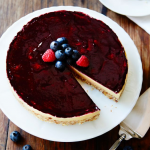Last updated on June 18th, 2019
For some, spring brings an inner rejoicing—the onset of warmer weather that allows us to pack away our winter woollies and step out into the sunshine again. For others, the onset of hay fever means that spring is a difficult season — full of itchy, watery eyes and sneezing fits. This truly irritating immune response occurs when a type of immune cell called a mast cell releases histamine – it can be debilitating for sufferers. Caused by reactions to substances in the air that we inhale or foods we consume, it can be set off specifically in spring when the grasses and plants begin to pollinate more heavily in response to the warmer weather.
Reducing your exposure to these substances isn’t always possible, without relocating! So here are seven natural anti-histamines and anti-inflammatory agents that can help you to keep your hay fever symptoms at bay.
Local honey
If we slowly and surely build up our body’s resilience to an allergen, it can reduce our reactivity to it. The bee pollen in honey can assist in desensitising your body to the pollens in the air. The bees from your local area will be pollinating the plants around you that are specifically causing you grief, so always make sure that you choose a local honey. Continue to eat small amounts of it throughout the year rather than just around hay fever season for the best results.
Vitamin C
Research has shown the combination of vitamin C and bioflavonoids to help reduce the inflammation caused by histamines. In order for these nutrients to do their work, the recommended daily dose is 2g of vitamin C and 1500mg of bioflavonoids. Vitamin C and bioflavonoids can be found in broccoli, capsicum, kiwifruit and citrus fruits or you may like to supplement. For optimum effect, take half a dose in the morning and half in the evening.
Turmeric
A known anti-inflammatory, turmeric, or specifically the active agent curcumin, supports a healthy immune system. It has been found to prevent the release of histamine from mast cells. Try grating this whole root into a stir-fry or juicing a 4-5cm piece with carrot and lemon. If you’re struggling to find it fresh, it is also readily available as a dried powder. Add a teaspoon to a smoothie or make your very own turmeric latte by combining it with milk of your choice, a teaspoon of coconut oil and a sprinkle of pepper, which assists your body to absorb the curcumin.
Eat more quercetin rich foods
Studies have established that this flavonol can help to reduce the immune system’s reactivity to histamine. High amounts of quercetin can be found in sweet potato, watercress, broccoli, kale and green tea. You can also find it as a supplement. To reduce inflammation and histamine in your system, take a therapeutic dose of 600mg of quercetin three times daily.
Omega-3 fatty acids
While there is no evidence to support omega-3 fatty acids as a direct allergy remedies, studies have proven that it may assist through association by dampening down the production of prostaglandin E2 and inflammatory cytokines—two inflammatory chemicals in the body. Good sources of omega-3 fatty acids are oily fish, such as sardines or salmon, walnuts and flaxseed oil.
Vitamin A and zinc
Both of these integral nutrients help to stabilise the structure of the membrane. This helps it to become less reactive to histamine, reducing production of mucous and overall irritation. Including some foods that are rich in these two substances every day can be very beneficial. Beef, lamb, oysters and seeds (such as sunflower and pumpkin) are food sources of zinc. Vitamin A (or beta-carotene which can be converted into vitamin A) can be found in dark leafy greens, apricots, carrots, sweet potato and liver.









